If you’re considering ditching the traditional lifestyle of a house or apartment and trying out life on the road, then living in an RV could be the perfect solution for you.
Not only does it offer all of the comforts you know and love, but it also provides freedom to travel when, where, and how often you please!
In this article, we will explain everything you need to know about budgeting for an RV lifestyle. So keep reading if this sounds like a dream come true!
Table of Contents
Main Costs for Full-Time RV Living
Gas and Propane
If your RV has a gas engine, you will pay for gas at the pump. Depending on the size of your vehicle and type of engine, you can expect to pay between $100 and $300 per month for fuel.
If your RV uses propane instead of gas, you can expect to pay around $15 – $20 a month to fill your tanks.
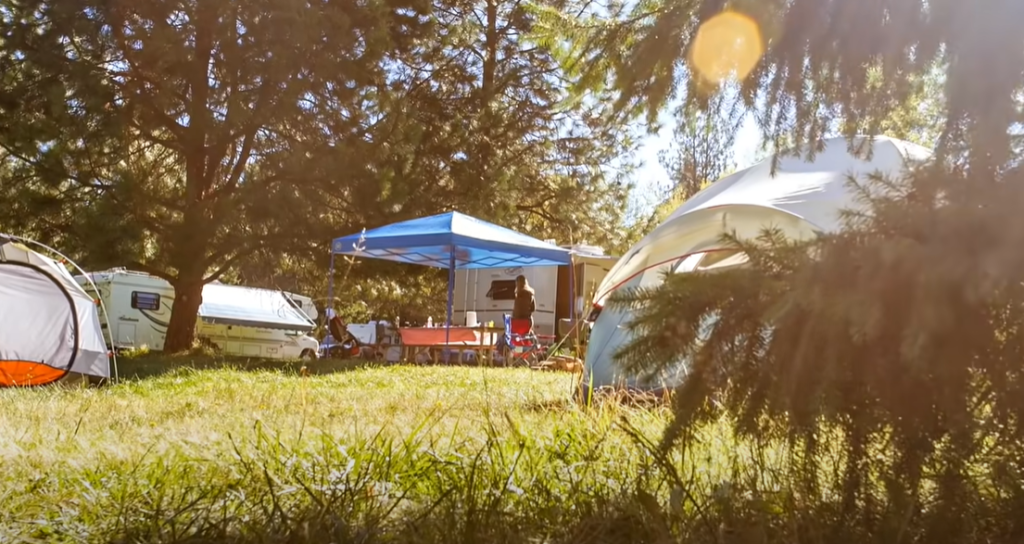
Campsite Fees
Campsite fees can range from free to very expensive. Often campsites will charge a fee for hookups (water, electric, and sewer). Generally speaking, you can expect to pay between $100 – $200 per month on campsite fees. [1]
RV Parks vs. Boondocking
RV parks are a great way to stay connected and meet other RVers, but they can be quite expensive. Monthly rates in RV parks range from $350 – $800 per month depending on the type of park and what is included.
Boondocking is a cheaper way to stay than at an RV park. You can stay on public land, like a national forest, for free or very cheaply.
Boondocking is good for people who want to stay in more remote areas and don’t need things like water or electricity hookups.
National / State Park Campgrounds
National and State parks are a great option for RVers who want to explore the outdoors. Fees can vary by state, but generally they range from $15 – $45 per night.
Food
Living in an RV doesn’t mean you have to skimp on food or supplies. You will need to budget for groceries, toiletries, and other items that you would normally buy while living in a house or apartment. A good rule of thumb is to budget around $400 per month for food and supplies.
Truck Loan and Maintenance
If you are driving a truck to tow your RV, it will come with its own set of costs. This includes the loan payment if you purchased the truck, as well as fuel and maintenance costs. You can expect to pay between $100 – $300 per month for these types of expenses.
Living in an RV is an exciting adventure, but it is important to know the costs associated with such a lifestyle. By understanding the main costs of RV living, you can plan ahead and make sure that your budget is realistic and achievable.
Insurance
Insurance is an important consideration when living in an RV. You will need to pay for insurance on both the RV and the truck that you are using to tow it, if applicable.
Costs vary depending on type of coverage, age of vehicles, and location. However, you can expect to pay between $50 – $200 per month for insurance.
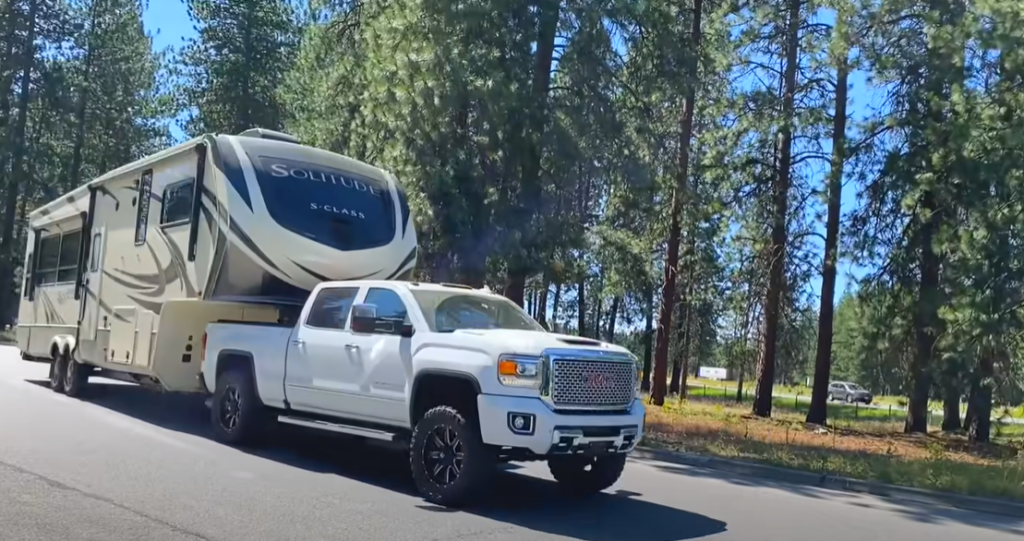
Phone and Internet
If you want to be able to use your phone and the internet while you are travelling, you will need to buy a plan from a phone company. This will cost you $50-$100 per month, depending on how much data you use and what type of service you want.
Entertainment and Recreation
Living in an RV doesn’t mean you have to give up your hobbies or favourite activities. You can still go out to dinner, explore new areas, and participate in outdoor recreation.
However, it is important to factor the cost of these activities into your budget. You should plan on spending $50 – $100 per month for entertainment and recreational activities.
Rig repairs and Maintenance
Having an RV does come with its own set of maintenance costs. Things like regular oil changes, filter replacements, and other repairs can add up quickly. You should plan on spending around $100 – $200 per month for Rig repair and maintenance. [2]
Vehicle Insurance
You’ll need to make sure that both your RV and tow vehicle are insured. This means you’ll want to shop around for the best coverage at the lowest cost.
Generally, you can expect to pay between $50 – $200 per month for insurance on both your rig and tow vehicle.
Health Insurance
If you are not covered by your employer’s health insurance, you’ll need to purchase your own.
Health insurance plans vary greatly in terms of coverage and cost, so be sure to shop around for the best plan for your needs. You can expect to pay between $100 – $400 per month for health insurance.
Other Costs
There are other miscellaneous costs to consider when living in an RV. These can include things like campground fees, laundry costs, and fuel. Be sure to factor these into your budget when estimating the cost of RV living.
Set Up a Budget
The best way to make sure that you can live in your RV and afford it is to set up a budget. This includes all of the costs listed above, as well as any other expenses that you might have while living on the road. Once you have your budget set up, try not to spend more money than what you have budgeted for.
By budgeting for all of your expenses and sticking to a realistic plan, you can ensure that your RV dream is both enjoyable and affordable.
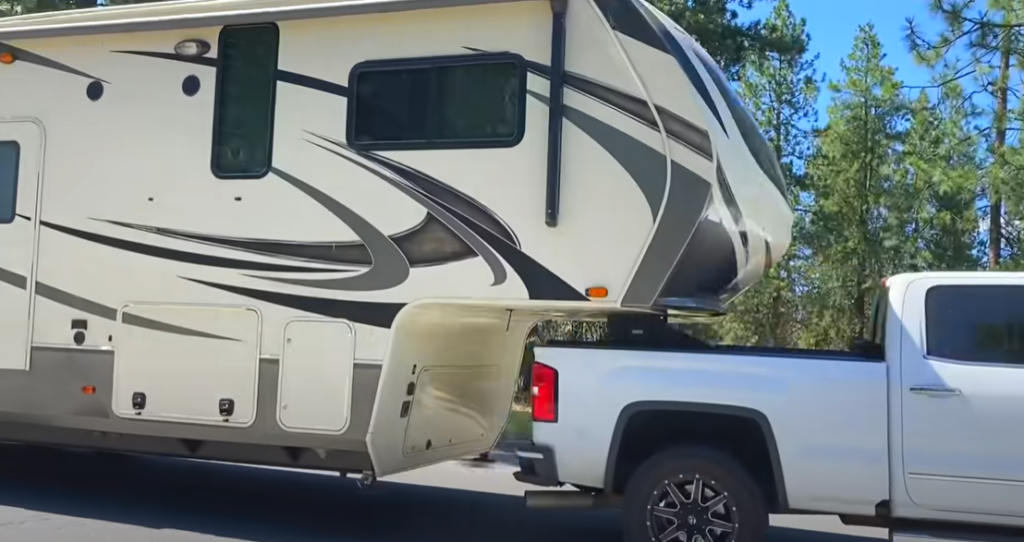
Find Ways to Save Money
There are a few ways that you can save money while living in an RV. One way is to look for campgrounds or RV parks with reduced rates.
You should also take advantage of discounts and specials wherever possible, such as memberships or loyalty programs offered at certain campsites.
Additionally, try to find free activities in the area that you are visiting and make sure to plan ahead so that you can avoid unnecessary expenses.
Pros and Cons: RV Living vs. House Living
Living in an RV has both benefits and drawbacks that must be weighed when making the decision to live on the road.
Pros:
- Ability to travel and explore new places.
- More affordable than traditional housing options.
- Lower cost of living due to a smaller space.
- Less upkeep required for an RV than a house.
- More freedom and flexibility in terms of living arrangements.
Cons:
- Limited space compared to a traditional home.
- Unpredictable weather can make travelling difficult or uncomfortable at times.
- Lack of access to certain amenities such as grocery stores, gyms, etc.
- Potentially higher costs for fuel and maintenance.
- Access to reliable internet and cell phone service can be limited in certain areas. [3]
Is It Financially Smart to Live in an RV?
Living in an RV can be both a fun and financially smart choice depending on your situation. By budgeting carefully and taking advantage of discounts, you can keep your costs low and make the most of your adventure.
Additionally, because RVs require less upkeep than traditional homes, you will save money over time by avoiding costly repairs or renovations.
Ultimately, the decision of whether or not to live in an RV is a personal one and should be based on your individual needs and goals.
FAQ
Is it legal to live in an RV full-time?
Yes, it is legal to live in an RV full-time. However, you must check with local laws and regulations for any restrictions or requirements on living in an RV.
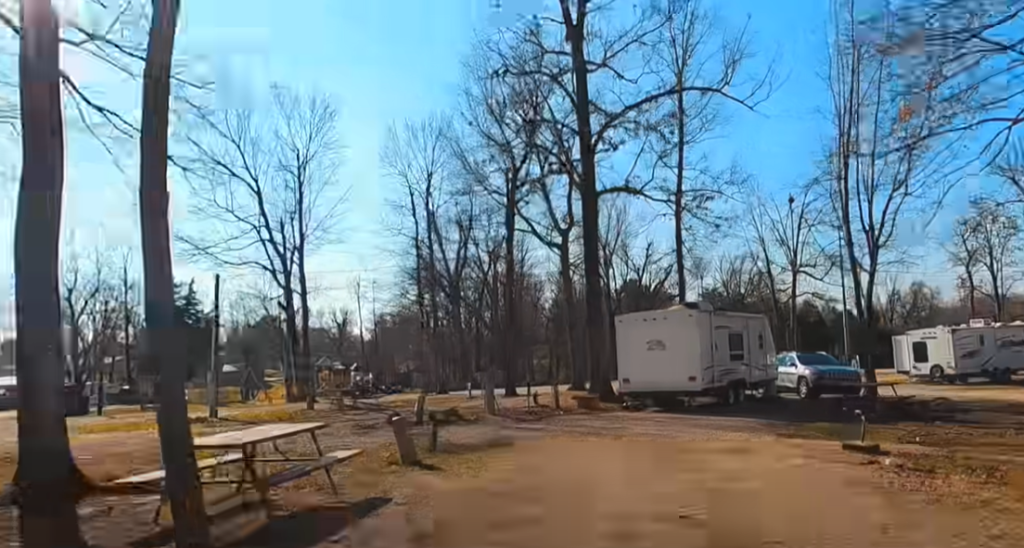
How much does it cost to live in an RV?
The cost of living in an RV varies depending on a variety of factors such as location, type of RV, lifestyle, and more. Generally speaking, you can expect to pay $1,000 – $3,000 per month for all expenses related to living in an RV.
What is the best way to save money while living in an RV?
The best way to save money while living in an RV is to budget carefully, look for discounts and specials, and take advantage of free activities wherever possible. Additionally, try to find campgrounds or RV parks with reduced rates whenever you can.
What are the pros and cons of living in an RV?
The good things about living in an RV are that you can travel and see new places, it costs less money to live in an RV than a house, and RVs don’t need as much work as houses.
The bad things about living in an RV are that there is less space than in a regular house, the weather can be bad sometimes, and you might not have access to places like grocery stores or gyms.
Is it financially smart to live in an RV?
Living in an RV can be both a fun and financially smart choice depending on your situation. By budgeting carefully and taking advantage of discounts, you can keep your costs low and make the most of your adventure.
Additionally, because RVs require less upkeep than traditional homes, you will save money over time by avoiding costly repairs or renovations.
Can families live in an RV?
Yes, it is possible for families to live in an RV. However, it is important to think about how much space your family needs and what kinds of activities you like to do when choosing the right type of RV for your family.
Additionally, some activities may need to be modified or skipped while living in an RV with a family. For example, larger families may need more room than a smaller camper van can provide.
Ultimately, the decision of whether or not to live in an RV with your family should be based on your individual needs and goals.
Can you homeschool your kids in an RV?
Yes, it is possible to homeschool your kids in an RV. However, it is important to plan ahead and make sure you have the necessary resources for homeschooling in an RV.
Additionally, depending on where you are travelling, there may be different laws and regulations that you need to follow when homeschooling.
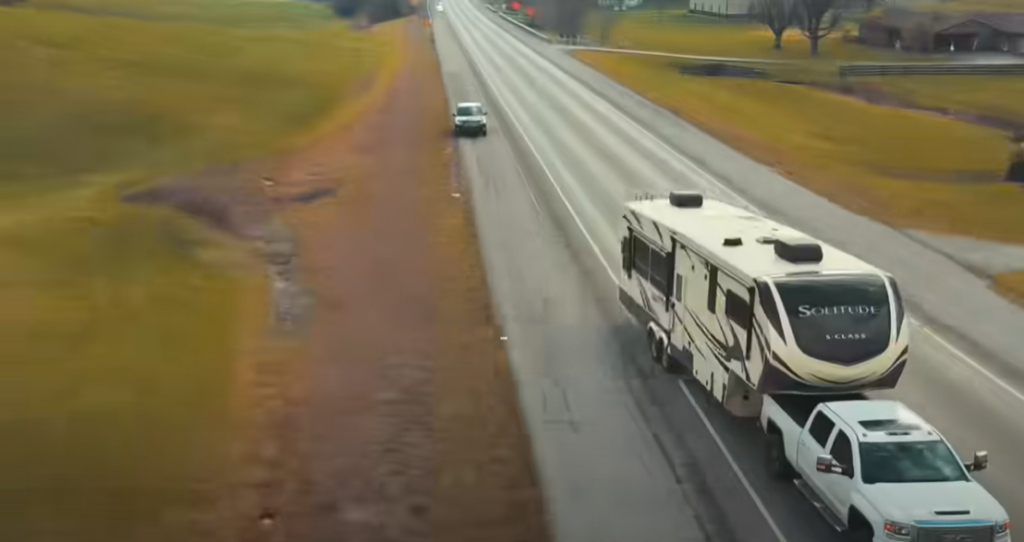
Can you make your RV your primary residence?
Yes, you can make your RV your primary residence. However, it is important to remember that RVs are not permanent dwellings and you may have to move periodically or take certain steps in order to maintain residency in one place for an extended period of time.
Additionally, local laws and regulations regarding RV living should be taken into account when making the decision to make your RV your primary residence.
What are the tax implications of living in an RV?
The tax implications of living in an RV vary depending on individual circumstances. Generally, if you are using your RV as a primary residence, then you may be able to deduct some or all of your expenses related to it from your taxes.
Additionally, if you own the RV and use it as a primary residence, then you may be able to deduct depreciation from its value over time.
However, it is important to check with a tax professional for more information about the specific implications of living in an RV for your individual situation.
What are the long-term benefits of living in an RV?
The long-term benefits of living in an RV include being able to travel around, experience new places and cultures, make new friends, save money on housing costs, and generally enjoy a simpler lifestyle.
Additionally, you can have peace of mind knowing that if something changes or goes wrong with your RV, you can move on to another location quickly and easily.
What are the best tips for living in an RV?
Here are some tips for living in an RV: Be careful with your money so you don’t spend too much. Look for discounts and special offers. Keep your RV clean and in good condition.
Learn the laws and regulations before you choose where to live in your RV. Make sure you are comfortable in your RV. Have a plan for if something goes wrong or you need more money than you expected.
How can I save money while living in an RV?
You can save money while living in an RV by finding discounts, taking advantage of free activities and services, taking public transportation when possible, cooking at home instead of eating out, and doing regular maintenance on your RV to help avoid costly repairs.
Additionally, look for camping sites that offer monthly or yearly discounts, and research whether the areas you are travelling to offer discounts on RV living. Finally, make sure to budget accordingly and plan ahead so you don’t overspend.
How do I keep my RV clean and organised?
It is important to keep your RV clean and tidy. This will help you stay healthy and comfortable. Vacuum and dust regularly, use air fresheners, do laundry often, and use storage bins or drawers for clothes and other items.
You can also add shoe racks or organisers to help maximise space. Don’t forget to clean and organise your RV before you leave for your next adventure!
How do I decide what kind of RV to buy?
When deciding what kind of RV to buy, you should consider your budget, the size and layout that best suits your lifestyle and needs, whether you need a towable or self-contained RV, and any features you may want.
Additionally, it is important to research different types of RVs so you can make an informed decision. Finally, always check the condition of any used RV you may be considering before buying it.

What other expenses should I consider when living in an RV?
When living in an RV, there are a few other expenses you should consider. These include insurance for your vehicle and equipment, registration fees, fuel costs, storage fees if necessary, maintenance and repair costs, and any additional items that may be needed to make the experience more comfortable or easier.
Why is living in an RV so popular?
Living in an RV is becoming increasingly popular due to its convenience, affordability, and the ability to travel around. Additionally, it can be a great way to experience new places and cultures while having the comfort of your own home with you.
People are also drawn to the simplicity and freedom that comes with living in an RV. With the right planning and budgeting, it can be a rewarding and enjoyable lifestyle.
Does living in an RV provide any tax benefits?
Yes, living in an RV may provide some tax benefits. Depending on the location and type of RV you own, certain deductions or credits may be available to you.
Some people who use their RV as a primary residence are eligible for a homestead tax exemption, while those who travel around can often deduct their travel expenses on their taxes.
It is important to research your local laws and regulations for detailed information about RV tax benefits.
Do I need to register my RV?
Yes, you will need to register your RV. Most states require that RVs be registered with the DMV before being used on public roads. Generally, registration fees are minimal and can be done quickly and easily.
Additionally, many states offer discounts for registering an RV in their state. It is important to verify the registration requirements for your state before hitting the road.
Does living in an RV require any special skills?
Living in an RV does not typically require any specialised skills or knowledge. However, it can be helpful to have some basic knowledge of plumbing and electricity so you can do minor repairs or maintenance on your own.
Additionally, it is important to familiarise yourself with the laws and regulations in each state before travelling, as they may vary from location to location.

Do I need to have a driver’s licence to drive an RV?
Yes, you will need to have a valid driver’s licence in order to legally drive an RV. Depending on the type and size of your vehicle, you may also need additional permits or endorsements.
Additionally, some states have specific regulations regarding who can operate a motorhome or towable RV, so it is important to research the laws in your area before you hit the road.
Does living in an RV require any special equipment?
Yes, living in an RV may require some special equipment. If you will be staying at RV parks or campgrounds, you will need to have a sewer hose and/or connection kit that meets the requirements of your destination.
Additionally, you may want to invest in additional items such as surge protectors, portable generators, or hoses to make your stay more comfortable.
Can I live year-round in an RV?
Yes, it is possible to live year-round in an RV. However, you may need to make some special preparations such as winterizing your vehicle and making sure you have sufficient supplies for colder climates.
Additionally, you may need to acquire a mailing address if you will be living on the road full-time, as mail and packages cannot typically be sent to an RV.
Can I make money while living in an RV?
Yes, there are many ways to make money while living in an RV. Of course, you can work a traditional job and have your paycheck direct-deposited into your bank account or mailed to you at your mailing address.
But some people also supplement their income by doing odd jobs, selling crafts or artwork, or offering services such as web design or photography.
Can I travel with pets while living in an RV?
Yes, you can definitely travel with pets while living in an RV. Many campgrounds and parks are pet-friendly, but it is important to do your research before arriving at a new destination.
Additionally, some states have restrictions on the types of animals that can be transported across state lines, so be sure to check the laws in your area before travelling.
Which type of RV is best for living in?
The type of RV that is best for living in will depend on your personal needs, lifestyle, and budget. For example, those who plan to stay in one place for extended periods may opt for a larger motorhome or fifth wheel trailer. Those who want to travel more extensively may choose a smaller vehicle such as a travel trailer or pop-up camper. Ultimately, the best type of RV for you will depend on your individual needs and preferences.
Which type of RV is more cost-efficient?
Generally speaking, travel trailers and pop-up campers tend to be more cost-efficient than motorhomes or fifth wheel trailers.
These smaller RVs usually require less fuel and are easier to tow, which can help save money on gas and maintenance costs. Additionally, they often have fewer amenities, making them a more affordable option for those on a budget.
When is the best time to buy an RV?
The best time to purchase an RV varies depending on your budget and needs. Generally speaking, late summer and fall are good times to get the most bang for your buck, as dealers may be looking to clear out last season’s models.
Additionally, many campgrounds offer discounted rates during the off-season, so this may be a good time to purchase an RV if you plan on travelling frequently.
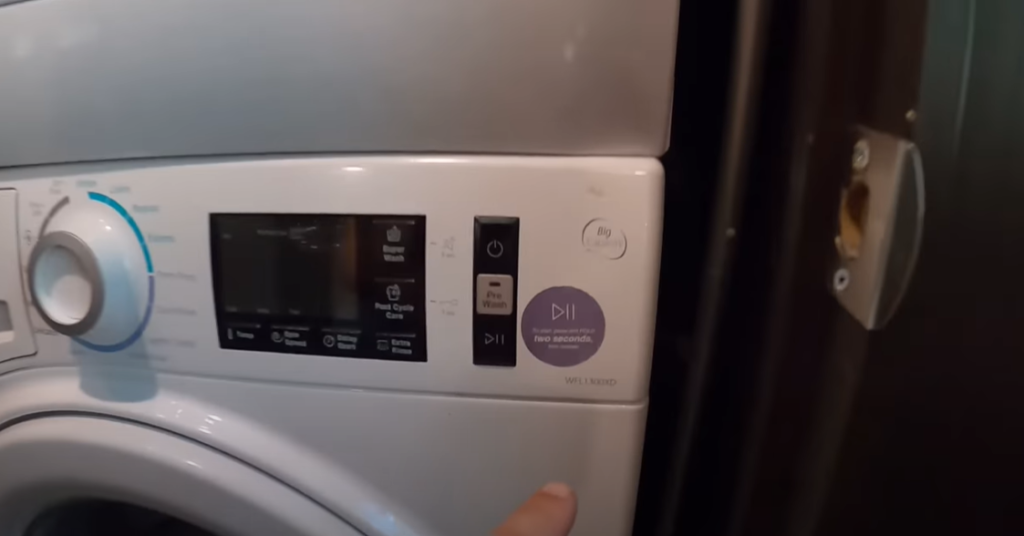
Can I rent an RV?
Yes, you can absolutely rent an RV. There are many companies that offer short-term and long-term RV rentals, so you can try out living in an RV without making a long-term commitment.
Additionally, many campgrounds and parks also offer rental units, so this is another great option if you want to take a test drive before buying your own vehicle.
Which states have the best RV parks?
The best RV parks depend on what you like, how much money you want to spend, and what kind of things you want to do. In general, people like going to the western United States because there are different types of land and lots of things to do outside.
Some people go to California, Arizona, Colorado, Utah, Montana, Idaho, New Mexico, or Oregon. Other people go to Florida, Texas, or Alaska because they want to see something different.
How can I save money while living in an RV?
There are many ways to save money while living in an RV. One of the best ways is to take advantage of campground discounts and membership programs. Additionally, you can also save money on fuel costs by limiting the amount of time you drive each day, using a gas rewards program, or taking advantage of lower-priced diesel fuel.
Finally, it is important to stay organised and minimise your expenses by sticking to a budget and shopping for deals whenever possible.
Do I need special insurance for an RV?
Yes, you will likely need a specialised type of insurance when living in an RV. This may include coverage for personal items, liability protection, and physical damage to the vehicle itself.
Be sure to research your options and shop around for the best rates before making a final decision.
What safety precautions should I take when living in an RV?
Living in an RV can be a great way to explore different parts of the country, but it is important to stay safe while on the road. Make sure your vehicle is properly maintained and inspected for any potential safety hazards.
Additionally, it is also a good idea to keep a fire extinguisher on board and practise basic safety measures such as checking for gas leaks and being aware of your surroundings. Finally, it is also important to have a plan in case of an emergency.
Why is living in an RV such a popular option?
People are living in RVs more because it is a flexible way to live. You can take your RV with you when you travel. This means you don’t have to worry about finding a place to stay when you’re exploring different parts of the country.
RVs are also usually more affordable than buying or renting a traditional home, which makes them attractive for people who are trying to save money.
Finally, RVs provide a great way to connect with nature and have unique experiences that you may not find in a more conventional living situation.
Useful Video: RV LIVING COSTS: How much does it REALLY cost to full time RV?
Conclusion
Travelling in an RV can be a great experience. You get to see new places and explore the world. But it’s important to know how much it will cost you to live in an RV before you make the jump.
The costs of living in an RV can vary depending on your lifestyle, but there are some general expenses that you should be aware of.
We’ve compiled a list of some of the most common costs associated with living in an RV so that you can start budgeting for your own adventure. So what are you waiting for? Start planning your next road trip today!
References:
- https://nomadsinnature.com/blog/cost-of-rv-living
- https://rvlife.com/monthly-cost-of-full-time-rving/
- https://tinyhousedesign.com/is-it-cheaper-to-live-in-an-rv-than-a-home/#FAQs

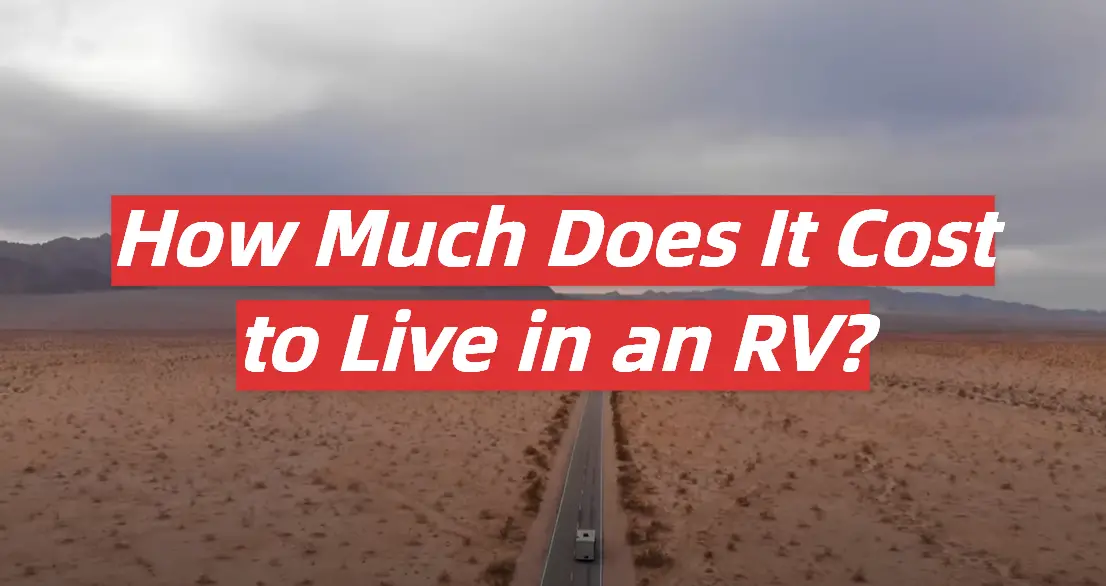

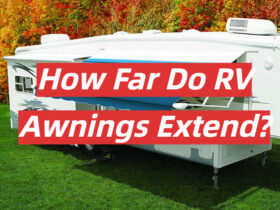
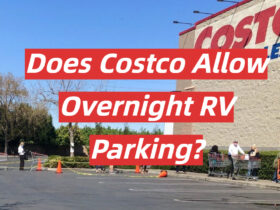
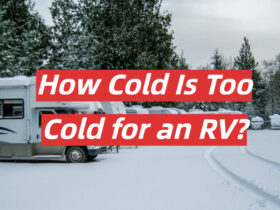
Leave a Reply